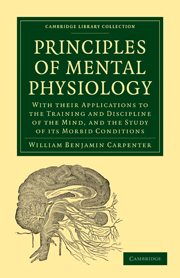 Principles of Mental Physiology
Principles of Mental Physiology Book contents
- Frontmatter
- PREFACE
- Contents
- BOOK I GENERAL PHYSIOLOGY
- CHAPTER I OF THE GENERAL RELATIONS BETWEEN MIND AND BODY
- CHAPTER II OF THE NERVOUS SYSTEM AND ITS FUNCTIONS
- CHAPTER III OF ATTENTION
- CHAPTER IV OF SENSATION
- CHAPTER V OF PERCEPTION AND INSTINCT
- CHAPTER VI OF IDEATION AND IDEO-MOTOR ACTION
- CHAPTER VII OF THE EMOTIONS
- CHAPTER VIII OF HABIT
- CHAPTER IX OF THE WILL
- BOOK II SPECIAL PHYSIOLOGY
- APPENDIX. DR. FERRIER'S EXPERIMENTAL RESEARCHES ON THE BRAIN
- INDEX
CHAPTER VI - OF IDEATION AND IDEO-MOTOR ACTION
Published online by Cambridge University Press: 29 August 2010
- Frontmatter
- PREFACE
- Contents
- BOOK I GENERAL PHYSIOLOGY
- CHAPTER I OF THE GENERAL RELATIONS BETWEEN MIND AND BODY
- CHAPTER II OF THE NERVOUS SYSTEM AND ITS FUNCTIONS
- CHAPTER III OF ATTENTION
- CHAPTER IV OF SENSATION
- CHAPTER V OF PERCEPTION AND INSTINCT
- CHAPTER VI OF IDEATION AND IDEO-MOTOR ACTION
- CHAPTER VII OF THE EMOTIONS
- CHAPTER VIII OF HABIT
- CHAPTER IX OF THE WILL
- BOOK II SPECIAL PHYSIOLOGY
- APPENDIX. DR. FERRIER'S EXPERIMENTAL RESEARCHES ON THE BRAIN
- INDEX
Summary
Section I.—Of Ideation Generally.
196. In ascending the scale of Psychical activity, we find the operations of the Intelligent Mind becoming more and more independent of the Sensorial changes which first excited them. It has been shown that in the first or sensational stage, the Consciousness is. engrossed with self, not being as yet awake to the existence of any external cause for the subjective change it experiences; whilst in the second or perceptive stage, in which that objective cause is apprehended as something not-self, the Mind is entirely given-up to, the contemplation of it, and recognizes its properties as the sources of the various affections it experiences. Some of these affections relate to knowledge, whilst others partake more of the nature of feeling; but in all of them the percipient mind is brought face to face, as it were, with the object perceived; and the knowledge which comes to us from this direct relation, whether through our original or our acquired intuitions, has a certainty to which no other kind of knowledge can lay claim. But it is not until the Mind attains a still higher kind of activity, that it forms that distinct mental representation, or idea, of the object, which stands altogether apart from our immediate experience, and assumes the character of an independent Intellectual reality.
- Type
- Chapter
- Information
- Principles of Mental PhysiologyWith their Applications to the Training and Discipline of the Mind, and the Study of its Morbid Conditions, pp. 220 - 315Publisher: Cambridge University PressPrint publication year: 2009First published in: 1874


